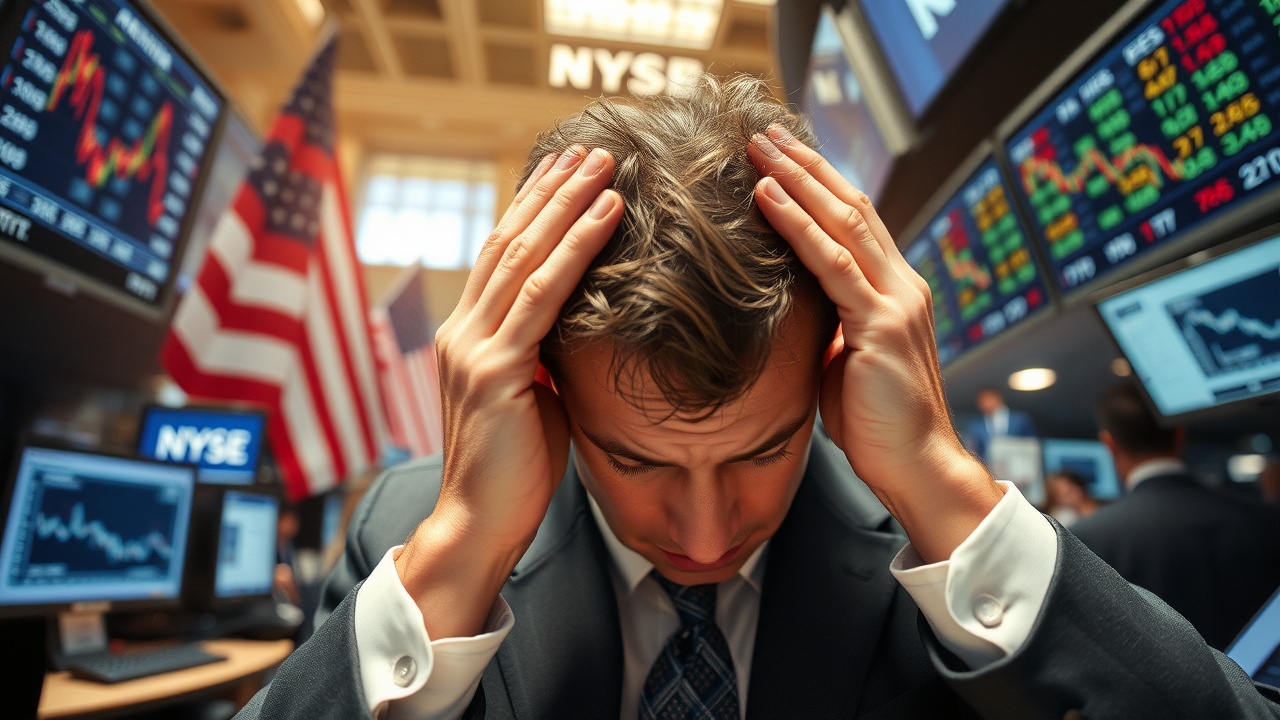
Due to Donald Trump's "Liberation Day" tariffs, the world stock market has crashed
What do tariffs mean for your money, why are they bad for markets, and what are they?
US President Donald Trump's announcement of broad "Liberation Day" tariffs has caused market chaos. Since the announcement of tariffs, the S&P 500 has lost over 10% of its value, and when markets open today (Monday, April 7), it is predicted to fall even more.
The Hang Seng fell more than 13 percent, the Shanghai Composite more than 7 percent, and the Taiex nearly 10 percent during Monday's trading hours, which was a bloodbath for Asian markets. Similar to this, European markets saw a sharp decline in value at market opening.
Aggressive tariffs enforced in the US have alarmed investors, as they have the potential to increase inflation and impede economic expansion. In addition to more severe measures for nations with a significant trade deficit with the US, Trump has set a 10% "baseline" tariff on all imports into the US.
The people Trump considers the "worst offenders" have been the targets of the harshest penalties. There will be tax increases of up to 50% in 60 countries. A 34 percent tariff rate will be imposed on China, 24 percent on Japan, and 20 percent on the European Union. The baseline tariff of 10% will affect the UK.
Trade between countries could be seriously hampered by the measures.
According to Russ Mould, investment director at platform AJ Bell, "double-digit drops in a single day for a major stock index are uncommon, but today is one of those days that will go down in history." "Being unrelenting, this market sell-off feels cruel. We frequently observe one or two poor days followed by a recovery. We are currently in day three, and the sell-off is getting worse rather than getting better.
"A major slowdown in economic growth and a significant hit to corporate earnings are the main concerns of investors. There are more questions than answers raised by the possible end of globalization, and this uncertainty is having a disastrous effect on markets," he continued.
What are tariffs, and what has caused the market meltdown?
Import taxes known as tariffs raise the cost of purchasing goods from other countries. In order to encourage consumers to purchase domestically produced goods, they are frequently enforced as part of protectionist policies. Although importers usually include the cost of tariffs in their prices, the company that imports the goods is responsible for paying them.
According to Donald Trump, tariffs will benefit the US economy. He has consistently attacked the trade imbalances that exist between the United States and its trading partners. According to consultancy Capital Economics, tariffs could increase customs duties by up to £835 billion while also incentivizing consumers to purchase domestic goods. According to its economists, when the resulting drop in imports is taken into account, this amount will most likely come to very nearly £700 billion.
But the bigger picture is more nuanced.
Because importers must pay the tax, imposing tariffs raises the cost of imported goods for US consumers. If US-made products contain imported parts, their price may also increase. Tariffs have a negative impact on consumer choice. In the past, consumers may have been able to save money by purchasing cheaper imports, but tariffs reduce these savings.
Policies such as this have a huge contagion effect, which means that consumers outside of the US will also be affected. International economies function within a network of interdependencies. Prices may begin to increase globally as more nations impose retaliatory tariffs in response. Additionally, as it gets more costly for businesses to purchase goods and conduct business, growth may stall.
"This upending of the global trade system will slow growth, possibly trigger recessions, and ultimately raise costs for consumers, not least in the US itself," Jason Hollands, managing director at wealth management firm Evelyn Partners, stated. "Higher friction costs on trade are ultimately bad for everyone, even countries like the UK that got off relatively lightly."
He went on to say, "President Trump may have some valid complaints about the international economic system that has been in place for almost 50 years and has led to unfair trade for the United States, but this will prove to be an act of self-harm in the near future as the costs of imports increase both directly and for US companies that use imported components."
Major companies like Apple and Tesla, according to Hollands, manufacture parts in China; the sportswear brand Nike sources goods from Vietnam, which is subject to a 46 percent tariff; and the chip giant Nvidia manufactures some of its chips in Taiwan, which is subject to a 32 percent tariff.
"The goal is to make it difficult for companies, both domestic and foreign, to relocate their manufacturing to the United States. Hollands continued, "That won't happen overnight."
For your money, what do tariffs mean?
Trump's decision to remove some of the regulations or grant exemptions, as he has done in the past, will have a significant impact. However, the markets are losing hope. "Sometimes you have to take medicine to fix something" was the president's second response when he was questioned about the declining stock markets over the weekend.
Even if you do not actively trade stocks and shares, the measures announced will affect nearly every part of your financial situation. Trump's announcements have already had an impact on your pension, the savings market, and the mortgage market.
Interest rates as well as inflation.
You might anticipate that interest rates would remain higher for a longer period of time if tariffs increase inflation, but in recent days, markets have actually moved in the opposite direction to price in a faster pace of Bank of England cuts. Central banks must strike a balance between worries about growth and inflation. Recessionary risks appear to be the main concern of markets.
Growth of the UK economy.
Having been hit with the baseline 10 percent levy, the UK is in a better position than many other economies. Nonetheless, the impact will still be felt by many businesses, especially when coupled with domestic obstacles such as the increase in employers' National Insurance contributions. The Bank of England's growth projection for 2025 has already been cut in half, from 1 percent to 0.75 percent.
It's a sad fact that redundancies may increase and wages will likely grow more slowly.
Mortgage interest rates.
Mortgage rates may decrease if interest rates are lowered more swiftly to offset slowing economic expansion. Early indications of this are already apparent. Sarah Coles, head of personal finance at investment platform Hargreaves Lansdown, stated, "Swap rates have changed, which should result in lower fixed rate mortgages in the days ahead." Since the beginning of 2025, these have already slightly decreased and are probably going to keep doing so.
Rate of savings.
Anticipating quicker base rate cuts, savings rates are likely to decline even more. For the time being, they appear to be quite strong, with providers raising cash ISA rates to attract clients before the tax year ends, but expect declines in the days and weeks ahead. If you have some money that you are willing to put away for a certain amount of time, now might be a good time to adjust your savings.
Pensions.
Remember that investing is a long game, even though your pension has likely suffered greatly in recent days due to the global stock market sell-off. Recoveries usually occur after market dips, if you are properly diversified and remain in the market for a sufficient amount of time.
According to the Investment Association's director of market insights, Miranda Seath, "right now, the only certainty seems to be uncertainty, but that isn't always bad for returns." "There may be some intriguing investment opportunities in times of market volatility. Markets move in cycles, so it's crucial to keep in mind that investing is for the long haul, even though we know investors will be looking for ways to navigate today's unpredictable markets.
Those who choose their own investments may want to review their approach to make sure they are appropriately diversified, but most people will be saving into a workplace pension where the investment selection is frequently managed on their behalf.
Seath went on to say, "A lot of investors will now be considering how exposed they are to the US markets." "We should anticipate that investors will be investigating alternative prospects over the coming months, possibly in Europe or even the UK.
Gold and government bonds, which are considered "safe-haven" assets, have also seen inflows as investors seek to diversify their holdings.














Leave a comment on: What are tariffs and how do they affect your finances?